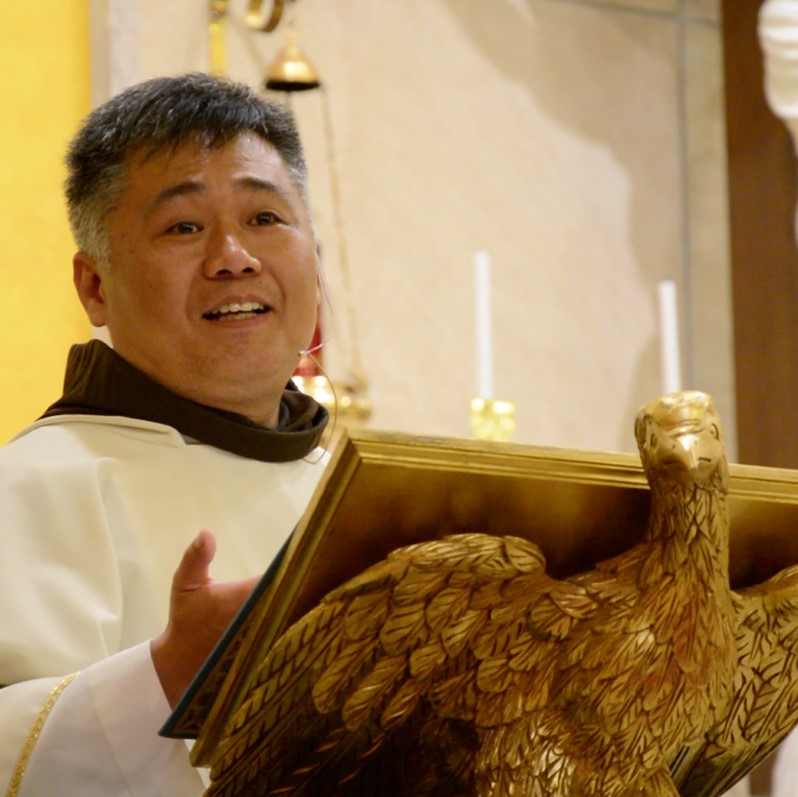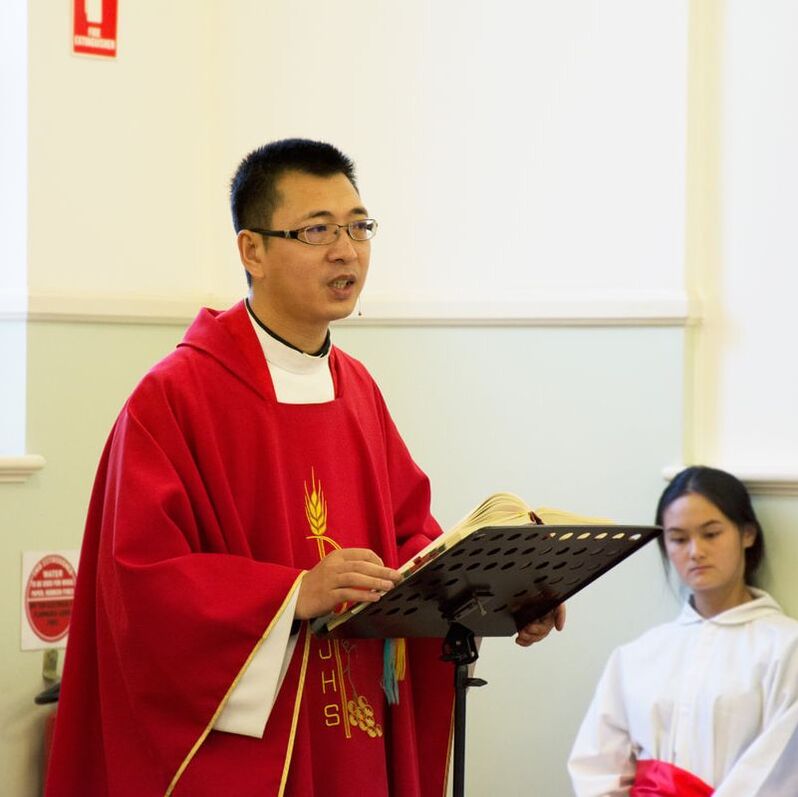Our Parish at St Dominic's
Our Parish aims to help its members advance in lives of holiness while assisting the mission of the Church in its local and universal dimensions.Because we are a small parish, we do not have any employees and rely on volunteers to manage the many activities which the parish conducts for the spiritual benefit of its members. New Here?Give - Coming Soon
Meet Our Team
Parish Clergy
St Dominic’s Parish is under the Pastoral Care of the Franciscan Friars (Order of Friars Minor), founded by St. Francis of Assisi.

Father Joseph Yong Lu OFM
Parish Priest

Father Philip Miscamble OFM
Assistant Priest

Father Jacob Wang
Assistant Priest

Father Paul McGee
Assistant Priest

WESTERN SYDNEY CATHOLIC CHINESE COMMUNITY
We take immense pride in serving as the vibrant centre for the Western Sydney Catholic Chinese community (WSCCC) here in Flemington. Our close-knit community represents a beautiful blend of Mandarin-speaking individuals from China and devoted converts who have embraced the Catholic faith in Australia.
Under the compassionate guidance of Fr. Joseph Yong Lu OFM we strive to foster a warm and inclusive environment for Mandarin-speaking Catholics across Sydney.
Join us every Saturday at 7 p.m for the Vigil Mass and Sunday at 11:30 a.m. for Mass at St. Dominic’s Church, where we come together to strengthen our spiritual bond.
WSCCC is committed to nurturing the growth of our youth, offering comprehensive catechetical instructions for converts, and fostering fellowship through our cherished community lunch, lovingly prepared by our dedicated team of rotating volunteers.
Moreover, we have established an accessible office within St. Dominic’s Parish, serving as a vital resource centre and a welcoming point of contact for community outreach initiatives. We aspire to foster unity, faith, and a sense of belonging among all members of our Catholic Chinese community.
Email: info@wsccc.org
SUDANESE AUSTRALIAN CATHOLIC COMMUNITY
St Bakhita Centre
The Sudanese Australian Catholic Community has been provided with St Bakhita Centre at 2 Hornsey Rd, Flemington, next to the church, through the generosity of Cardinal Pell.
The Centre is staffed by Pastoral Care Workers Mrs Anna Dimo (Full-Time) and Sr Maria Sullivan and Mr Peter Leke (Part-Time). The photo shows Anna and Sr Maria in front of the Centre.
The Centre caters for the spiritual and pastoral needs of the Sudanese Refugee community in Sydney. Volunteers provide tutoring in English, Computer, Sewing and Music as well as Child Care.
If anyone would like to volunteer please contact:
Anna Dimo: 0409 458 695
Peter Leke: 0427 209 122
Sr Maria: 0408 615 671
ST DOMINIC'S CHOIR
The parish choir provides leadership for the parish in praising God through his gift of song.
The choir sings at the 9:00 a.m. Sunday Mass and at the 12:00 p.m. First Saturday Mass.
Our choir are a cherished part of the Catholic Parish of St Dominic’s whom the whole parish take great pride in.
New members are always welcome. Please contact the parish priest if you are interested in joining the choir.
ALTAR SOCIETY
A group of ladies are rostered each week to help with those works in the sacristy which need a little more care.
The sacred vessels and altar linens require special attention so that what is used for the service of God is noble and worthy.
The ladies of the altar society do a superb job of keeping all this in top condition.
If you would like to help, please contact the parish priest.
PARISH SACRAMENTAL PROGRAMME
The parish celebrates the major Sacraments of Penance, Holy Communion and Confirmation with programmes of catechists coordinated by the Parish Priest together with a dedicated band of catechists
Because the parish is very small Confirmations occur only every two years, whereas Penance and Holy Communion are celebrated each year.
Parishioners who are eligible should contact the Parish Priest to enquire about instructions for the reception of these Sacraments.
CATECHISTS
The Catechists of the parish do a superb job teaching the children of Homebush West Public School the truths of the Faith and instructing them in the life of faith and the practice of the Sacraments.
The Catechists Coordinator has responsibility under the Parish Priest for managing the classes of Catholics who receive instruction during the time allocated by the government in public schools.
We try to have two teachers together in each class to share the load and provide mutual support, and there are wonderful results.
If you would like to assist, no experience is necessary.
Just contact the Parish Priest.

The Life of St Dominic
St Dominic Guzman, founder of the Dominicans or Order of Friars Preachers, was born at Calaruega in Castile in 1170. Until he was thirty-five he led a life cloistered and studious. He studied first under his uncle, archpriest of Gumiel, then for ten years at the University of Palencia. When he was twenty-four he was invited by Diego, bishop of Osma, to join his reformed canons regular, of which in due course he became superior, then prior.
Continue reading
Blessed Jordan of Saxony, his first biographer, hints at the apostolic zeal burning within him at this period: 'God had given him a special grace of prayer for sinners, for the poor, for those in suffering; he bore their affliction in the close sanctuary of his compassion, and his tears ... betrayed the ardor of the feeling within him.' Then in 1205, Dominic accompanied Diego on an official mission for Ferdinand of Castile across Europe. On their way back the two men visited Rome and petitioned Pope Innocent III to release them from their duties at Osma for work in the foreign mission field around the Dnieper.
Innocent III had long been looking for men to carry out the work of preaching in the south of France, to counteract the influence there of the Albigensian heretics who taught that everything material was evil and of the devil. Perfection consisted in an inhuman self-denial and austerity; short of this, it became a matter of indifference whether, for example, one married or committed fornication, as both belonged to the material order and were, therefore, evil. Marriage was, if anything, the worse evil for being set up as good and virtuous. Such doctrines utterly undermined the social institutions of property and the family, and the heretics did not scruple to work secretly, setting children against parents, wives against husbands. They had their own rites and hierarchy, and were divided into the perfecti, the extremely austere leaders, and the mass of their followers, who found in the new doctrines a convenient excuse for unbridled moral freedom. The heresy sprang from the unrest of a period of transition, and the accompanying ferment of new and challenging ideas. Catholics, and in particular the clergy, were not only living in the past, but had little or no grasp of Christian doctrine.
Innocent III had appealed two years earlier to the Cistercian Order. They had responded generously; and two of them had gone as Papal Legates to Languedoc, where they had become absorbed in political and administrative schemes for the reform of the clergy and the expulsion of heretics. What was needed was an evangelical example as inspiring as that of the heretics' own leaders. In Innocent's words, 'A famine has come into the land, the little ones cry out for bread, and there is found none to break it to them.' Instead of allowing Diego and Dominic to go to the foreign missions, Innocent sent them to the south of France. The two newcomers rallied the dispirited legates, Cistercian reinforcements arrived, and by April, 1207, within a year of the new start, there were forty missionaries in the field. Initial successes came, but they did not last. It was not easy, after all, to change the heretics. The end of the year brought disaster: the Cistercian monks, deeply discouraged, went home; Diego, returning to Spain to fetch auxiliaries, died there; one of the legates also died; and, worst of all, Peter of Castelnau, the other legate, was assassinated by the heretics. It was a fate largely the result of his own froward disposition which had, all along, been no help to the preachers, but it was a signal for war.
The Catholic lords launched a civil war of religion against the Albigensians, and Dominic was left preaching where he could, matching the austere example of the perfecti by his own exacting mortifications. 'A man who governs his passions is master of the world,' he said. 'He must either rule them or be ruled by them. It is better to be the hammer than the anvil.' For six years Dominic weathered the storm. He had founded earlier at Prouille a religious community of women, converts from heresy; they were not almost his only support. At last in 1215 peace came, and in the reorganisation that followed the bishop of Toulouse turned to him to re-establish Innocent's 'preaching' in his diocese; but there had matured in Dominic's mind wider designs. He had only six companions, yet he proposed to Innocent, in that same year, that they should form not a diocesan body but a world-wide Order of Preachers. This enlargement of Innocent's original conception had no precedent in Christian history, but Dominic's quality had been proved, and Innocent consented. Dominic was told to draw up a constitution, and, a year later, the new Pope, Honorius III, approved the Order of Friars Preachers.
St. Dominic immediately dispersed his followers, by now sixteen in number, throughout Europe; and he, himself, travelled the whole of Europe on foot, organising the Order. In 1220 he convened the first Chapter at Bologna, where the final constitutions of the Order were determined. These, based upon the experience gained and St. Dominic's outstanding gifts of clarity and flexibility, are one of the most remarkable legislative achievements of western Christendom, and to them must be attributed the continuing vigor and unity of the Dominican Order. Dominic had but one more year to live. Before his death Dominicans were sent to Oxford, to Hungary, Denmark and Greece. Everywhere the Order gathered to itself the flower of university life, though remaining at the same time broadly popular in appeal. St. Dominic died at Bologna, surrounded by his brethren, on August 6th, 1221. He was canonised in 1234. St. Dominic's character was one of extraordinary integrity and completeness. To an exquisitely sensitive nature, reflected even in his bodily beauty, he united a rare discipline of mind and soul; and he was the perfect instrument to combat the gloomy heresy of Albigensianism. His order has ever since stood for the value of all things creaturely as well as divine; and it has always welcomed new ideas while holding fast to well-understood principles from the past.
St Dominic’s became a parish in 1928 and the church was opened and blessed by Cardinal Gilroy in 1956
Contact Parish
Cnr The Crescent & Hornsey Road
Homebush West
NSW 2140, Australia
Phone: (02) 9746 7245
Email: info@stdominic.au
Clergy: Fr Joseph Yong Lu OFM
